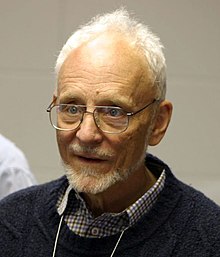|
Elwyn Berlekamp
Elwyn Ralph Berlekamp (September 6, 1940 – April 9, 2019) was a professor of mathematics and computer science at the University of California, Berkeley.[1][2] Berlekamp was widely known for his work in computer science, coding theory and combinatorial game theory. Berlekamp invented an algorithm to factor polynomials and the Berlekamp switching game, and was one of the inventors of the Berlekamp–Welch algorithm and the Berlekamp–Massey algorithms, which are used to implement Reed–Solomon error correction. He also co-invented the Berlekamp–Rabin algorithm, Berlekamp–Zassenhaus algorithm, and the Berlekamp–Van Lint–Seidel graph. Berlekamp had also been active in investing, and ran Axcom, which became the Renaissance Technologies' Medallion Fund. Life and educationBerlekamp was born in Dover, Ohio. His family moved to Northern Kentucky, where from 1954 Berlekamp attended Fort Thomas Highlands High School in Fort Thomas, Kentucky. He was elected class president and joined the swim team which practiced naked at the local YMCA pool; Berlekamp was the slowest swimmer but chose swimming because of the low level of competition compared to other sports.[3] He decided to attend the Massachusetts Institute of Technology (MIT) after learning it did not have an American football team. At MIT, his freshman professors included John Forbes Nash Jr. and he was a Putnam Fellow during his senior year in 1961.[3][4] He completed his bachelor's and master's degrees in electrical engineering in 1962. Berlekamp did internships at Bell Labs in 1960 and 1962, where his boss was John Larry Kelly Jr.[3] Continuing his studies at MIT, he finished his Ph.D. in electrical engineering in 1964; his advisors were Robert G. Gallager, Peter Elias, Claude Shannon, and John Wozencraft. Berlekamp met his wife, Jennifer Wilson, in 1964 after juggling in his apartment and having to apologize for causing a noise disturbance.[3] They had two daughters and a son. He lived in Piedmont, California and died in April 2019 at the age of 78 from complications of pulmonary fibrosis.[5] CareerBerlekamp was a professor of electrical engineering at the University of California, Berkeley from 1964 until 1966, when he became a mathematics researcher at Bell Labs. In 1971, Berlekamp returned to Berkeley as professor of mathematics and computer science, where he served as the advisor for over twenty doctoral students.[1][2][6] He was a member of the National Academy of Engineering (1977)[7] and the National Academy of Sciences (1999).[8] He was elected a Fellow of the American Academy of Arts and Sciences in 1996,[9] and became a fellow of the American Mathematical Society in 2012.[10] In 1991, he received the IEEE Richard W. Hamming Medal,[11] and in 1993, the Claude E. Shannon Award. In 1998, he received a Golden Jubilee Award for Technological Innovation from the IEEE Information Theory Society.[12] Along with Tom M. Rodgers[13] he was one of the founders of Gathering 4 Gardner and was on its board for many years.[14] In the mid-1980s, he was president of Cyclotomics, Inc., a corporation that developed error-correcting code technology.[1] He studied various games, including dots and boxes, fox and geese, and, especially, Go. Berlekamp and co-author David Wolfe describe methods for analyzing certain classes of Go endgames in the book Mathematical Go. Berlekamp and Martin GardnerBerlekamp was a close friend of Scientific American columnist Martin Gardner and was an important member of the gifted and diverse group of people that Gardner nurtured and acted as a conduit for; people who inspired Gardner and who were in turn inspired by him.[15] Berlekamp teamed up with John Horton Conway and Richard K. Guy, two other close associates of Gardner, to co-author the book Winning Ways for your Mathematical Plays, leading to his recognition as one of the founders of combinatorial game theory.[16] The dedication of their book says, "To Martin Gardner, who has brought more mathematics to more millions than anyone else."[17] Berlekamp and Gardner both had great love for and were strong advocates of recreational mathematics.[16] Conferences called Gathering 4 Gardner (G4G) are held every two years to celebrate the Gardner legacy.[15] Berlekamp was one of the founders of G4G and was on its board of directors for many years.[18] Selected publications
See alsoReferences
External links
|
||||||||||||||||||||||||||||
Portal di Ensiklopedia Dunia
